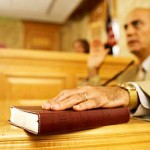Springtime for Daubert: Insights From the EDWBA Panel
 In late January the “tort reform” package imposed the staid Daubert rules on the Wisconsin Rules of Evidence. Now it’s spring, although the weather feels a lot like January, and we must get serious about what to do with this gift that the judiciary did not want. The new rules require that expert testimony be based on demonstrably reliable methods and principles. To be determined is whether Wisconsin will be a “strict” or a “lax” Daubert jurisdiction — whatever that is. It is worth noting that the first wave of Wisconsin Daubert cases, which will likely set the mold for what follows, are also those that least interested the tort reformers, namely, criminal cases and “chapter 980” sexually violent offender cases.
In late January the “tort reform” package imposed the staid Daubert rules on the Wisconsin Rules of Evidence. Now it’s spring, although the weather feels a lot like January, and we must get serious about what to do with this gift that the judiciary did not want. The new rules require that expert testimony be based on demonstrably reliable methods and principles. To be determined is whether Wisconsin will be a “strict” or a “lax” Daubert jurisdiction — whatever that is. It is worth noting that the first wave of Wisconsin Daubert cases, which will likely set the mold for what follows, are also those that least interested the tort reformers, namely, criminal cases and “chapter 980” sexually violent offender cases.
Right now, however, we are in a state of nature, legally speaking. Case law under the relevancy test, the current standard, is of little avail. And while the new rules are copied from the federal rules, state courts are not bound by federal precedent (yes, that includes Daubert itself!). Last week alone I spoke at two conferences, one a large, attentive gathering of state judges in Elkhart Lake and the other an even larger, equally engaged joint convocation of state prosecutors, public defenders, and private defense counsel here at Eckstein Hall. There is a clamor for answers and a discernable unease about what to do.

